The rest of Donizetti’s overwrought Lucia di Lammermoor is fluff, fun and filler — something to hum along with between those big numbers. That’s the way it was a generation ago when the opera was a major vehicle for super sopranos Maria Callas, Joan Sutherland and Beverly Sills. Without one of them in the cast Lucia was a ho-hum affair.
But now the Central City Opera has combined the talents of veteran soprano Catherine Malfitano as director and youthful Russian-born coloratura Lyubov Petrova in the title role to give the world a whole new “take” on the work. The result, seen June 27 in the performance that opened the CCO’s 2009 season in its historic mountain home, is stupendous, and the ovation shouted by the audience at its conclusion was the greatest heard here in years — indeed, perhaps in decades. For Malfitano it’s the psychological machinations behind the melodramatic events of the story that are of primary interest. She digs beneath the skin to make these characters human, not mere singing mannequins. Moreover, Petrova, a rapidly rising star on today’s opera scene, responds with sympathetic intelligence and a voice now without rivals in this role.
The trio of immortals mentioned above with their command of bel canto pyrotechnics poured fuel on the fire in Donizetti’s score. Petrova underscores rather the gentle and dreadfully wronged woman that Lucia was, chattel for her brother in his efforts to save the family. Since replacing an ailing Natalie Dessay as Strauss’ Zerbinetta at the Met in 2001, Petrova has awed audiences not only with the beauty of her voice, but also with the absolute control that she has over it. In addition she’s a superb actress. She sings Lucia’s post-murder “Mad Scene” on a winding staircase, moving up and down with the ease of an insect while relishing the imagined happiness that is now hers in a realm beyond this earth. Lucia remains, of course, a child of her time when there was no safe house for battered women. Yet Petrova portrays her with a vulnerability that makes clear her understanding of the injustice done to her. It’s something to behold.
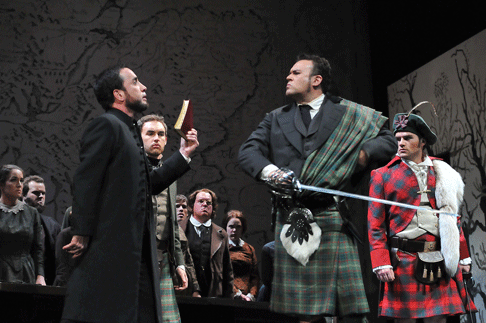 Raimondo calms the angered crowd seeking revenge against Edgardo. Pictured (Center- L to R): Richard Bernstein (Raimondo), James Barbato (Normanno), Grant Youngblood (Enrico), and Andrew Owens (Arturo). [Photo by Mark Kiryluk courtesy of Central City Opera]
Raimondo calms the angered crowd seeking revenge against Edgardo. Pictured (Center- L to R): Richard Bernstein (Raimondo), James Barbato (Normanno), Grant Youngblood (Enrico), and Andrew Owens (Arturo). [Photo by Mark Kiryluk courtesy of Central City Opera]
Several favorites return to the company to complete an enviably gifted cast. As Enrico Grant Youngblood brings depth to the usually one-dimensional scheming brother, Vale Rideout is the image of passionate suffering as Edgardo. Apprentice artist Andrew Owens displays tenor promise as ill-fated bridegroom Arturo in his brief appearance before he is felled by Lucia. But second best in the cast is one of America’s most versatile and gifted bass-baritones, Richard Bernstein. As the black-clad — and black-hearted — confessor Raimondo, he — Bible in hand — makes the corruption of the church palpable. He does this with a composed reserve that moves the figure beyond caricature. It’s Raimondo who breaks the horrid news about the murder and that he watches Lucia’s every move throughout the “Mad Scene” is a masterful “Malfitanoism.”
The director worked with designers Wilson Chin and Terese Wadden — sets and costumes — to create a production that takes full advantage of the intimacy of the CCO’s 550-seat house. Barren black trees amplify the ominous shadow that hangs over the hostile families of the drama, and — with the exception of Arturo, who suggests Disneyland on bargain day — plaids are largely subdued.
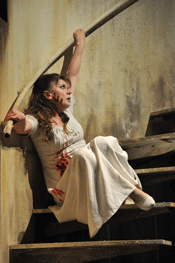 Lyubov Petrova as Lucia [Photo by Mark Kiryluk courtesy of Central City Opera]
Lyubov Petrova as Lucia [Photo by Mark Kiryluk courtesy of Central City Opera]
Lucia provides an opera chorus with a field day, and the ensemble has been perfectly prepared by Christopher Zemliauskas, a member of the University of Colorado faculty. Conductor John Baril makes magic with the CCO pit band, distinguished further by principal flutist Jessica Warren-Acosta as Petrova’s partner in the “Mad Scene.” No matter how you read the Sir Walter Scott’s novel that is the source of Donizetti’s libretto, Lucia is heavy stuff, and that encourages some to bring Wagnerian weight to the score. Not so Malfitano and crew who — stressing the marvelous lightness of Petrova’s voice — emphasize the transparency of the score and make it downright luminescent.
A triumph — in sum — for Central City, a company distinguished by its endeavor to excite and educate its audience. It is, of course, a coup that the company has been able to engage a young singer at the peak of her powers in Petrova.
CCO makes much of A Little Night Music
Stephen Sondheim once summed up A Little Night Music, his most popular work, as a mixture of “whipped cream and knives.” Only a master juggler can keep such conflicting ingredients in proper balance, and the Central City Opera has one in Ken Cazan, director of the production of the 1973 musical that opened July 4 at the company’s mountain home.
The CCO has profited often from Cazan’s genius, and here he outdoes even himself in the most difficult assignment he has yet undertaken at the nation’s second-oldest summer opera. Sondheim wove together a complex handful of influences in Night Music, beginning with Ingmar Bergman’s 1955 Smiles of a Summer Night, a film inspired, in turn, by the tale of alienated affections offered by Shakespeare in A Midsummer Night’s Dream. Then there’s the obvious reference in the title to Mozart’s popular K. 525.
Although without any concrete evidence of the work in the drama, it’s with Mozart that Sondheim provides the director with instructions, for to succeed Night Music must have the effervescent lightness and transparency of this composer. Although it’s hard to imagine a three-hour musical written almost exclusively in three-quarter time, such is the sophistication of the work that one realizes this only when one stops to think about it — and senses therewith just a hint of Rosenkavalier in the score.
That’s the whipped cream. And the knives?
Night Music is the story of several people hopelessly entangled in sensuality. (Its profundity, however, is obscured by music of midsummer magic and melancholy, darkened by a certain sadness.) While they know brief hours of happiness in this garden of sensuous delights, little of this pleasure carries over into the quotidian, where they live lives of (self)deception. They might waltz, but actually they are engaged in the universal dance of life threatened by “Everyday a Little Death.”
They have a lot of growing up to do, and Cazan left Saturday’s enthusiastic audience thinking they have done so. Sylvia McNair is ideal in the central role of Desiree Armfeldt, an actress never quite sure of what role she is. Without dominating the cast McNair, who has left the opera stage to concentrate on teaching, makes this her show and her “Send in the Clowns” the “hit” of the staging.
Robert Orth, for decades a CCO favorite in comic roles, is at his best as Frederick Egerman, the lawyer ex-lover of Desiree unable to consummate his late marriage to youthful Anne, sung with engaging innocence by Sarah Jane McMahon. Theology student Henrik Egerman, troubled by his love for his stepmother, is played with adolescent unease by Matthew Giebel, who is troubled further by the appeal of worldly servant Petra, sung with earthy abandon by Stephanie Nelson. Jeff Mattsey suggests that he has won the decorations on his uniform on the battlefield; not in the boudoir. Sarah Kleeman is a delight as his unhappy wife. Myrna Paris plays a crusty Madame Armfeldt, a senior who has been there and done it all perhaps dozens of times — and yet is alone in her old age. (The role was created by Hermione Gingold, who sang it both in New York and London.)
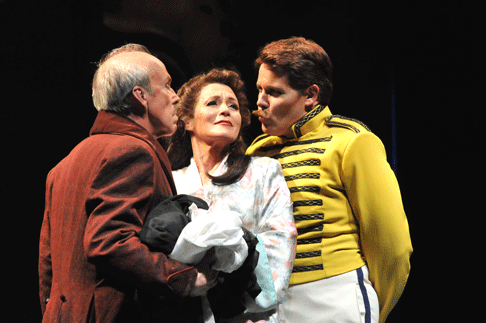
Designer Cameron Anderson takes cues from the music with blocks of furniture that roll magically on and off stage against cloth panels that provide the background for Sondheim’s rapidly changing scenes. A special delight are the antique cars that bring the finale of Act One to the very edge of the CCO stage. Costumes true to the Sweden of a century ago are by Alice Bristow.
Conductor Christopher Zemliauskas has a fine finger on Sondheim’s score, and the apprentice artists who complete the cast of 18 underscore the quality of this long-established CCO program. “But where are the clowns,” asks McNair/Desiree. “Quick, send in the clowns,” only to conclude “Don’t bother, they’re here.”
But there’s much more to this work than its greatest hit. Clowns Bergman’s troubled characters might be, but Cazan sees to it that they are never mere caricatures, but always provocative humans. In comments on Night Music, however, Cazan stresses how essential it is that the lyrics be understandable. It’s thus a pity that the CCO did not offer its now-traditional titles.
Central City gets a handle on Handel
Ever wonder why many of today’s seniors feel strangely unfulfilled — haunted by the anxiety that they’ve missed something essential in their many years? Small wonder! It’s all because they never had a chance to see a Baroque opera — to say nothing of a Baroque opera exquisitely done, which is the case with the production of Handel’s 1711 Rinaldo that opened at the Central City Opera on July 11.
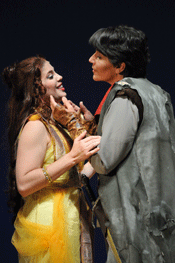 Megan Hart (Almirena) and Phyllis Pancella (Rinaldo)
Megan Hart (Almirena) and Phyllis Pancella (Rinaldo)
Baroque opera lost its appeal with the death of the castrati that brought vocal splendor to it in its 18th-century Golden Age. Even as the early-music movement gained ground, it was slow to face the challenge of opera. It only when Marilyn Horne put on trousers — and armor — to sing those sword-swinging generals of Vivaldi and Handel that the world realized what it had been missing.
But Baroque opera makes new — and huge — demands on a company for which Bohèmes and Butterflies have long been the source of success. Happily, in Rinaldo the CCO has met this challenge head on!
To start with, there’s the fact that Rinaldo calls for three countertenors! Fifty years ago there were only two in the whole world — Alfred Deller and Russell Oberlin, and they were viewed with suspicion as surviving court eunuchs. Even Peter Schickele — a.k.a. P.D.Q. Bach — put them down as “bargain-counter tenors.”
Although countertenors now grow on tuning forks, the CCO has recruited two of the currently finest — David Walker and Jason Abrams — to sing the brothers Goffredo and Eustazio who are out to make the First Crusade (1096-1099) a blood-dripping success. Both are all-male males who sing with ease and immense vocal beauty.
The third gender-bender in the cast, apprentice Tai Oney who sings heavily bearded hermit-magician Mao, lists officially as a male mezzo. With a voice of almost-baritonal timbre, he’s clearly headed for fame.
But these are only the trimmings!
The CCO made its first excursion into the Baroque in its then-74 years with its 2006 staging of Monteverdi’s Poppea. It was a sensation, and one knew that Rinaldo would be equally good when the company engaged three “stars” of that show for Handel.
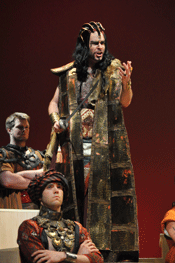 Joshua Hopkins (Argante) with his court
Joshua Hopkins (Argante) with his court
In addition to Walker and Abrams mezzo Phyllis Pancella is back as the shining knight whose story this is. Rinaldo is a role of Isolde-like demands and dimensions, and Pancella took it all in stride, leaving the large opening-night audience with terminal goose-bumps. Even the bad guys in the cast sing so marvelously and with such fervor that one can only rejoice and thump one’s New Testament when they see the light and fall on their knees before the cross.
Baritone Joshua Hopkins, back from last summer’s Lucretia, makes evil-bent Argante a snarling fiend, and Kathleen Kim as his equally malevolent sorceress-mate (you can’t have Baroque opera without a witch or two!) almost steals the show. Realizing that she has been betrayed by both sides (in Baroque opera you can’t really trust anyone) — Kim pours a lust for revenge into her big aria that makes it the highlight of the show. It’s amusing to think of venom-spewing Kim, already a presence on the international opera scene, as Mozart’s bird-brained bird woman Papagena, a role she has sung at the Met.
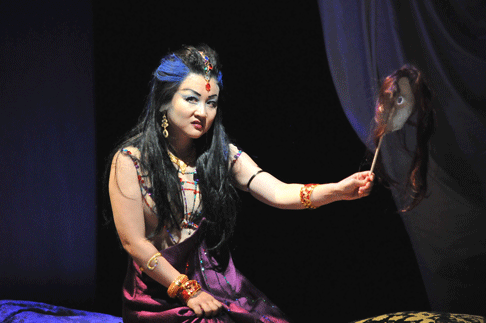 Kathleen Kim (Armida)
Kathleen Kim (Armida)
That in the midst of this fury one almost overlooks Megan Hart’s touching portrayal of Almirena, the gently loving innocent kidnapped by Armida and semi-raped by Argante, proves definitively that evil people are far more interesting than good people. (The tingle of sexual transgression is also essential to Baroque opera.)
Hart too — a former CCO studio artist still at the outset of her career — is clearly another stellar vocalist on the rise, and one is delighted that in the final scene she gets her — well — man. (By this time even the most vitriolic gay-marriage opponent can no longer tell boys from girls with any certainty.)
But the person who really wields the sword that triumphs over story and score is youthful British Baroque expert Matthew Halls who in his American opera debut transforms the CCO pit band with its modern instrument into an ensemble that rivals any Baroque orchestra around in making this production authentic. CCO instrumentalists are effusive in speaking of their work with Halls and of what they have learned from him. (Among Halls’ impressive credits is his role as keyboard artist in Dutchman Ton Koopman’s complete recording of Bach’s cantatas.)
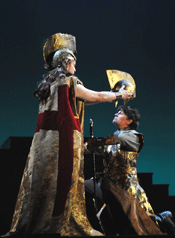 David Walker (Goffredo) and Phyllis Pancella (Rinaldo)
David Walker (Goffredo) and Phyllis Pancella (Rinaldo)
Not to be overlooked are the effectively simple sets of Caleb Wertenbaker and costumes by Sarah Jean Tosetti, all lighted with sophisticated sensitivity by David Martin Jacques.
Although this Rinaldo runs a full three hours, it never lags. Halls know how to handle (that word again!) the da capo arias that often make Baroque opera soporific. (It’s all about ornamentation, as he explains in a program-book interview.)
With the triumph of three new productions Central City has reached a new high of excellence and excitement in its 2009 season. As it was at its outset in 1932, the company is again a major player on the American opera scene and well on its way towards becoming the destination festival that it was in pre-Santa Fe days.
CCO announces 2010 season
It’s classic to contemporary works at the Central City Opera in 2010. Puccini’s Madama Butterfly opens the season in the production that brought famed soprano Catherine Malfitano to the company as director. Malfitano will also be on hand for the revival of the 2005 staging that set all-time box-office records at the CCO.
A Blast of Broadway, a revue that follows the progression of musical theater’s greatest triumphs, is the second production of the summer. It celebrates the CCO’s history, recalling the seasons from 1947 to 1974, when a Broadway “hit” was staged each August following the opera season. Walter Huston, Ruth Gordon, Neil Simon, Mike Nichols, and Francis Ford Coppola were among the stars on stage then in Central City.
Jake Heggie’s Three Decembers, a modern chamber opera about the struggles of a famous actress and her two adult children, concludes the season. Written for Frederica von Stade and premiered at the Houston Grand Opera in 2008, the CCO production will celebrate the 40th anniversary of mezzo Joyce Castle, cast as Madelaine.
For further information, visit Central City Opera’s web site.
Wes Blomster
![Lyubov Petrova as Lucia [Photo by Mark Kiryluk courtesy of Central City Opera]](http://www.operatoday.com/Lucia207.gif)






